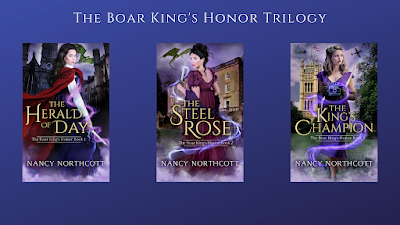A king wrongly blamed for murder A bloodline cursed until they clear the king’s name In 17th-century England, witchcraft is a hanging offence. Tavern maid Miranda Willoughby hides her magical gifts until terrifying visions compel her to seek the aid of a stranger, Richard Mainwaring, to interpret them.
The tale of the Princes in the Tower is a long-running controversy. Was Richard III responsible for their disappearance? Or did someone else do away with them? More than 500 years later, it’s still a mystery, and my interest in it sparked my Boar King’s Honor trilogy.
I’ve always loved history and mysteries and have been an Anglophile since grade school, so the story of the Princes in the Tower intrigues me. There are so many possible explanations for their disappearance in late 1483. I’m also intrigued by the controversy surrounding Richard III and his role (if any) in their disappearance.
Tower of London
The book spurred me to read as much as I could find on the subject. This was before there was an internet, so I couldn’t find nearly as much as I would’ve liked. What I did find, though, didn’t seem to support the traditional story.
I was practicing law at the time, and one of my first questions was why, when Henry VII took the throne, no one came forward to attest to the murders—or even the sudden disappearance—of two boys of royal blood. The boys had a household with attendants. Other people lived in the Tower. If Richard III had ordered his nephews murdered, speaking up during his reign would’ve been fatal. But after that, what was stopping anyone? Why did no one report seeing people burying bodies under a staircase?
As a longtime reader of fantasy, I figured the absence of witnesses made sense if the killers used magic. What if the wizard who helped them did so unwittingly and was tormented by guilt—but couldn’t speak up during the Henry VII’s reign? Meanwhile, Richard III’s reputation was smeared by King Henry to justify his usurpation of the throne.
What if the wizard couldn’t trust his direct heirs to reveal his role when it was safe to do so, when the last of the Tudors was gone, maybe decades or centuries hence? What if he wrote a confession and, for insurance, cursed the direct heirs of his line not to rest in life or death until King Richard’s name was cleared? He would effectively visit his sins on his children down through the generations—in the case of the trilogy, 450 years of them.
The trilogy grew out of this set of questions. One more question remained, what if your ancestor cursed you, condemning your soul to be trapped after death a shadowy, wraith-infested realm between those of the living and the dead unless you proved the truth about a centuries-old crime?
The hero of the first book in the trilogy, The Herald of Day, is Richard Mainwaring, Earl of Hawkstowe and direct descendant of the Edmund Mainwaring, the wizard who aided and abetted the murders. Richard has a drastic answer to that what if. Having seen his parents’ marriage destroyed by his mother’s resentment of what the curse means for him, Richard is resolved not to condemn another generation to this dire fate. He can’t lift the curse, but he can end the list of its victims—by ending the Mainwaring line. He won’t marry or beget children.
When a character in a novel makes a resolution like that, challenging it can drive a story. In Richard’s case, the first chink in his determination arrives as a slender thread of hope. A magical dragon summons him to Dover to meet a tavern maid and right a wrong. He might’ve ignored that, rare though magical summonses are, but the dragon calls him the boar’s knight. Richard III used a white boar as his emblem. Can this tavern maid hold knowledge that could help lift the curse? He feels compelled to go to Dover and find out.
The tavern maid, Miranda Willoughby, tells him of the vision that spurred her summons. In it, a green dragon with red and white wing striations, the colors and emblem of the Welsh flag, mortally wounds a white boar, only to have a knight on horseback charge in and vanquish the dragon. Richard recognizes the heraldic emblems and the situation as possibly related to Welsh Henry VII and Richard III. He invites the tavern maid to come to London and promises to train her in the use of magic. If she had more skill, she might be able to refine her visions and find the solution he needs.
Miranda is reluctant to leave the only home she has, the inn and tavern where she works. But the lure of lessons in magic is irresistible. She’s untrained because she had no one to teach her. Her mother, who was also magically Gifted, was executed as a witch when Miranda was small. Miranda not only lost her teacher but had a harsh lesson in the importance of concealing her abilities. Yet she loves her magic and yearns to know more about it.
Because romance raises the stakes in a story, Miranda and Richard are strongly attracted to each other. She sees their differing social statuses as a barrier while he clings to his resolve to end his cursed bloodline.
While they wrestle with magical training and unwelcome attraction, they must also confront a larger problem. The world is changing around them. People who died years ago walk the streets of London. Possessions disappear or reappear with no explanation, and the weather is changing in dire and unpredictable ways. Unbeknownst to them, a wizard has changed history to create a dictatorship of the magically Gifted with himself (of course) at the head, and the effects of that change are rippling forward in time. Miranda, Richard, and his friends must find out what has happened and restore the true timeline before the grim new reality becomes permanent.
Considering that this is a trilogy, it’s probably not a spoiler to admit they don’t succeed in lifting the curse. That problem faces their descendants in book two, The Steel Rose, which is set in the Hundred Days between Napoleon’s escape from Elba and the Battle of Waterloo, and book three, The King’s Champion, which opens with the Dunkirk evacuation and ends during the early days of the Blitz.
There’s an essay about my interest in Richard III on my website at https://www.nancynorthcott.com/me-and-richard-iii. The trilogy is complete and in Kindle Unlimited. The Herald of Day is here: https://www.amazon.com/Herald-Boar-Kings-Honor-Trilogy-ebook/dp/B07RYW35DX/
Thank you, Tony, for having me as a guest today.
Nancy Northcott
# # #
About the Author
Nancy Northcott earned her undergraduate degree in history and particularly enjoyed a summer spent studying Tudor and Stuart England at the University of Oxford. She has given presentations on the Wars of the Roses and Richard III to university classes studying Shakespeare’s play about that king. In addition, she has taught college courses on science fiction, fantasy, and society. The Boar King’s Honor historical fantasy trilogy combines her love of history and magic with her interest in Richard III. She also writes several types of romance and, with Jeanne Adams, the Outcast Station space mystery series. For more information about Nancy, visit her website, www.NancyNorthcott.com and follow her on Facebook, Bluesky and Twitter @NancyNorthcott.





No comments:
Post a Comment
Thank you for commenting